Words of Wisdom - Shastra
& Shastrakaras speak
For Books and shastra downloads see Main Index, under
Books:
Om Namo Bhagavate Vasudevaya
ye lila-amrta vine, khaya yadi anna-pane,
tabe bhaktera durbala jivana
yara eka-bindu-pane, utphullita tanu-mane,
hase, gaya, karaye nartana
Translation
"Men become strong and stout by eating sufficient grains, but the devotee
who simply eats ordinary grains but does not taste the transcendental pastimes
of Lord Caitanya Mahaprabhu and Krishna gradually becomes weak and falls
down from the transcendental position. However, if one drinks but a drop
of the nectar of Krishna's pastimes, his body and mind begin to bloom,
and he begins to laugh, sing and dance."
Purport
All the devotees connected with the Krishna consciousness movement
must read all the books that have been translated (the Caitanya-caritmrta,
Srimad-Bhagavatam, Bhagavad-gita and others); otherwise, after some time,
they will simply eat, sleep and fall down from their position. Thus they
will miss the opportunity to attain an eternal, blissful life of transcendental
pleasure.
Chaitanya Charitamrita, Madhya Lila 25.278
http://www.vedabase.com
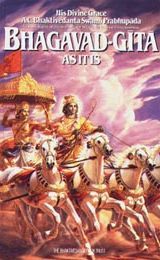

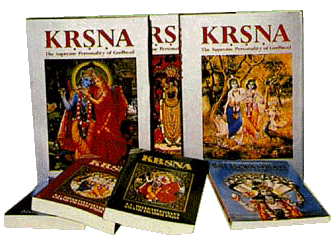
The Complete Works of Srila Prabhupada
All the books, the letters and conversations at your
fingertips
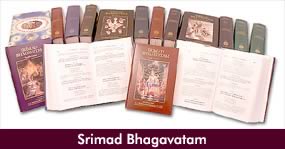

All Srila Prabhupada's books and more on one disk
http://www.vedabase.com




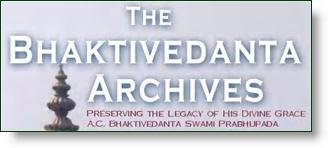
Srila Prabhupada's Audio lectures to listen to on-line:
http://www.hare-krishna.org/srila-prabhupada-lectures.htm
Listen to Srila A.C. Bhaktivedanta Swami Prabhupada on-line
- all 900 of his lectures are available HERE:
http://www.prabhupadavani.org/
Srimad Bhagavatam - the entire lecture series listen and
read along on-line - Narrated by Amala Bhakta dasa:
http://www.prabhupadavani.org/SB_index.html
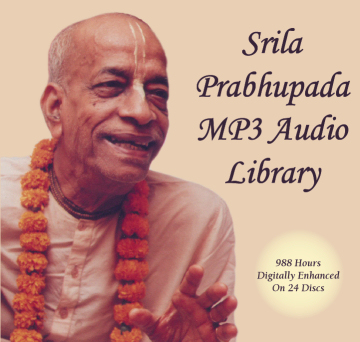
The new enhanced Prabhupada MP3 series
http://www.prabhupada.com/store/store.php?page=product.php&id=MP3AUDIOLIB

The Audio Srila Prabhupada Lilamrita
Please find enclosed details a being launched on Gaura Purnima day 2008.
It is a simple audio rendition of sections from "Prabhupada,
your ever well-wisher" by Satsvarupa dasa Goswami.
It was recorded here in the UK back in the mid '90's
by Bhagavat-Asraya prabhu (ACBSP) at my studio and I edited it into 8 short
instalments for inclusion on my weekly radio programme "Nectar of Devotion".
We had such a good response from listeners that it was
decided to add "The Audio Srila Prabhupada Lilamrita" to the Nectar of
Devotion website archive page.
In doing so I felt it might be nice to create a very simple,
seperate website for the Lilamrita.
The result is http://www.lilamrita.page.tl
It will be officially launched on Gaura Purnima day 2008
for the pleasure of Srila Prabhupada and all the Vaishnava's.
I hope this humble attempt will add to the growing appreciation
of Srila Prabhupada's remarkable achievements.
If other Krishna conscious radio stations would like
to broadcast this Lilamrita series they can contact me at devotion@nusoundradio.com
and I can send them mp3 copies.

The humble beginnings of Hare Krishna Movement -
part one 26 - 2nd Ave
http://www.youtube.com/watch?v=zago98QH1go
part two 26 - 2nd Ave
http://www.youtube.com/watch?v=hhgeUJQtsgY&feature=related
MATCHLESS GIFTS Part 1 - New York, Prabhupada,
http://www.youtube.com/watch?v=d5fobp-jJts&feature=related
MATCHLESS GIFTS Part 2 - New York, Prabhupada,
http://www.youtube.com/watch?v=oH6Xc210dRc&feature=related
MATCHLESS GIFTS Part 3 - New York, Prabhupada,
http://www.youtube.com/watch?v=35B4aHy6Br4&NR=1
Chants to Clean the Illuminati Brainwashing.
http://www.youtube.com/watch?v=ECmvesH3wqk&feature=related
TV Interview 1975 San Francisco
http://www.youtube.com/watch?v=wNCIy3O7tvY&NR=1

Srila Prabhupada Vyasa-puja book 2009
http://www.krishna.com/en/node/1968
Srila Prabhupada Vyasa-puja book 2008
http://www.krishna.com/en/node/1664
Srila Prabhupada Vyasa-puja book 2007
http://www.krishna.com/node/1048
Vyasa-puja is an annual celebration by the devotees of Lord Krishna
to offer homage to their guru, or spiritual teacher.
There are two versions of the Vyasa Puja Book based on the speed of
your internet connection.
If you are unable to open the file, download Acrobat Reader.
High speed connections, with pictures.
Vyasa-puja
Book 2007 [PDF/ZIP, 2.11MB]
Low speed connections, no pictures.
Vyasa-puja
Book 2007 (no pictures) [PDF/ZIP, 2.11MB]








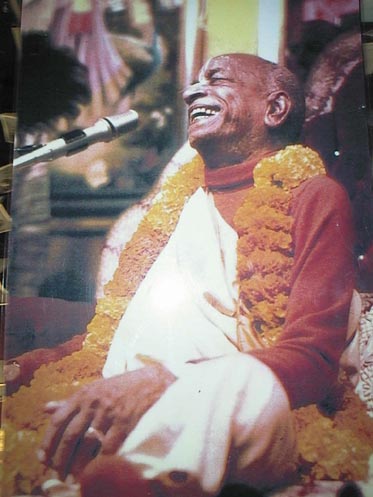
Visit "Prabhupada Connect" for all manner of Prabhupad
Nectar:
http://www.prabhupadaconnect.com/Index.html
Srila Prabhupada's Final Lesson Video - Downloadable and
viewing on-line
http://users.iskconludhiana.com/images/thumbnails.php?album=21
All pictures of Srila Prabhupad (19, 494)
http://www.iskconmedia.com/photos/Prabhupada_All_Photos/


All Srila Prabhupada's original books
available for sale here.

Download all the Hare Krsna teachings which includes
all Vaisnava and
Vedic concepts by visiting one of the sites listed at
the following address.
http://www.geocities.com/suci123/bookdownloadsites1.html
The Bhaktivedanta Book Trust
Srila Prabhupad Memorial Library
http://www.krishna.com/main.php?id=33


33 Books Online Including Srimad Bhagavatam!
http://www.geocities.com/freeprabhupadabooks
The compressed "self extracting" file mentioned is now currently
available for download
http://www.krsnaconsciousness.org/Gauranga/Folio/BhaktivedantaVedabase_DOS.exe

Download or Listen to Prabhupad Bhajans HERE:
http://www.prabhupadavani.org/web/text/Bhajans.html


On-line 1972 McMillan edition - Bhagavad Gita As It Is:
http://www.asitis.com/

Bhagavad Gita AS IT IS on-line through the Tirupathi
Balaji site:
http://www.bhagavad-gita.us/

Bhagavad Gita Study guide on-line book:
http://chantandbehappy.com/gita/studyguide/StudyGuide-main.htm
Bhagavad Gita Study guides by numerous Iskcon devotees
- FREE downloads:
http://www.veda.harekrsna.cz/library/#3

All the Scriptures you'd ever need 4 FREE
http://www.hknet.org.nz/index-books.htm
http://www.hknet.org.nz/DDB.htm
http://www.hknet.org.nz/DDB2.html
last updated 4th August 2003


Srimad Bhagavad Gita AS
IT IS
Bhagavad Gita: Chapter
7 - Knowledge of the Absolute
TEXT 17
tesam jnani nitya-yukta
eka-bhaktir visisyate
priyo hi jnanino 'tyartham
aham sa ca mama priyah
WORD FOR WORD
tesam--out of them; jnani--one in full knowledge; nitya-yuktah--always
engaged; eka--only; bhaktih--in devotional service; visisyate--is special;
priyah--very dear; hi--certainly; jnaninah--to the person in knowledge;
atyartham--highly; aham--I am; sah--he; ca--also; mama--to Me; priyah--dear.
TRANSLATION
Of these, the one who is in full knowledge and who is
always engaged in pure devotional service is the best. For I am very dear
to him, and he is dear to Me.
PURPORT by HDG Srila A.C. Bhaktivedanta Swami Prabhupad:
Free from all contaminations of material desires, the
distressed, the inquisitive, the penniless and the seeker after supreme
knowledge can all become pure devotees. But out of them, he who is in knowledge
of the Absolute Truth and free from all material desires becomes a really
pure devotee of the Lord. And of the four orders, the devotee who is in
full knowledge and is at the same time engaged in devotional service is,
the Lord says, the best. By searching after knowledge one realizes that
his self is different from his material body, and when further advanced
he comes to the knowledge of impersonal Brahman and Paramatma. When one
is fully purified, he realizes that his constitutional position is to be
the eternal servant of God. So by association with pure devotees the inquisitive,
the distressed, the seeker after material amelioration and the man in knowledge
all become themselves pure. But in the preparatory stage, the man who is
in full knowledge of the Supreme Lord and is at the same time executing
devotional service is very dear to the Lord. He who is situated in pure
knowledge of the transcendence of the Supreme Personality of God is so
protected in devotional service that material contamination cannot touch
him.
- His Divine Grace A.C. Bhaktivedanta Swami Prabhupada
Copyright 1983 The Bhaktivedanta Book Trust International. Used with
permission.

Bhagavad Gita As It Is - http://www.asitis.com/
Bhaktivedanta Vedabase - Bhagavad Gita on-line http://bhagavadgitaasitis.com/
Bhaktivedanta VedaBase: Bhagavad-gita As It Is http://vedabase.net/bg/en
Bhagavad Gita Multi Media Web-version http://chantandbehappy.com/gita/
Listen to Bhagavad Gita on line - http://www.Gitamrta.org
View our Bhagavad Gita Overview:
http://www.hknet.org.nz/BG.html
Archive: http://www.cs.rice.edu/~vivek/btg/archive/
Home Page: http://www.cs.rice.edu/~vivek/btg/
Join Bhagavad Gita eGroups HERE
mailto:bhagavad_gita-owner@egroups.com


Prabhupada Uvacha:
(here's some nectar, sometimes it comes in the form of Srutakirti prabhu's
diary, other times from Govinda dasi's diary, Hari Sauri prabhu's Transcendental
Diary, Bhurijan prabhu's book, or sometimes from a letter, or other related
source, but still nectar...)
Revolutionise the whole rascal civilisation
On the previous night, Prabhupada had asked Tusta
Krsna Swami that he and his men should visit the temple daily. Tusta Krsna
Swami explained that they couldn't really do that because they lived so
far away on the North Shore. Besides, Tusta explained, they were regularly
holding their own daily program. Prabhupada became lenient. "At least you
should bring fresh milk and cream and vegetables to the temple to be offered
to the Deities daily," he had said.
Around mid-morning, some of Tusta's men arrived
with buckets of fresh milk and cream. Tusta Krsna informed Srila Prabhupada
of his plans to build his own Vrndavana-style temple on the farm. Prabhupada
happily encouraged him.
"Not only one, you construct hundreds of temples.
Village to village, town to town. It will revolutionise the whole rascal
civilisation."
--------
Later in the afternoon, devotees from the temple
and the North Shore sat together in the temple room, enjoying a feast of
Krsna prasadam.
Srila Prabhupada asked Dayasara in his room, "What
is all that noise downstairs?"
"That's the feast, Srila Prabhupada."
Prabhupada was surprised. "Oh? There is a feast?"
Dayasara, who had cooked the feast, was acutely
embarrassed that he had forgotten to inform Prabhupada. Guru Krpa Swami
was angry. "Go and get some of that prasadam for Srila Prabhupada, right
away!"
Dayasara soon returned, and Srila Prabhupada tasted
some of each preparation.
-------
The late edition of The Auckland Star featured
an article and photograph from that morning's press conference. The article
was honest and forthright. Prabhupada especially appreciated that the newspaper
had quoted him accurately as saying:
We don't depend on city authorities -- we depend
on Krishna.
- From "The Great Transcendental Adventure" by
HG Kurma Prabhu
To receive little snippets of nectar like this on a daily basis subscribe
HERE: or If you want to introduce anyone else in reading Srila Prabhupada
Nectars, please send their eMail addresses to mailto:krpamaya_gauranga@hotmail.com
Please Chant:
 Hare
Krishna Hare Krishna Krishna Krishna Hare Hare
Hare
Krishna Hare Krishna Krishna Krishna Hare Hare
 Hare
Rama Hare Rama Rama Rama Hare Hare
Hare
Rama Hare Rama Rama Rama Hare Hare
...................and be Happy

Listen to Srila Prabhupad on-line
....a different lecture, morning walk, conversation or
class daily.
"The Way To Save Society"
73/07/27 London, Bhagavad-gita 1.37-39
Listen to the entire lecture on-line:
http://prabhupadavani.org/M3U/Gita/m3u/GT024.m3u
Pradyumna (leads chanting, etc.):
yady apy ete na pasyanti
lobhopahata-cetasah
kula-ksaya-krtam dosam
mitra-drohe ca patakam
katham na jneyam asmabhih
papad asman nivartitum
kula-ksaya-krtam dosam
prapasyadbhir janardana
[Bg. 1.37-38]
Translation: "O Janardana, although these men, overtaken by greed,
see no fault in killing one's family or quarreling with friends, why should
we, with knowledge of the sin, engage in these acts?"
Prabhupada: So other party, Duryodhana's party, they were not considering
all these pious or impious, sinful or vicious, activities. Because lobha-upahata-cetasah:
"They have lost their sense on account of greediness for acquiring the
empire." When one becomes lusty or overpowered by greediness, then he loses
all intelligence. There are many places stated that. Kamais tais tair hrta-jnanah
yajanti anya-devatah [Bg. 7.20]. Krsna says that "Those who are worshipers
of other demigods..." Actually worshipful is the Supreme Lord Krsna. Others,
they should be shown respect. But worship means for the Supreme Personality
of Godhead. He is worshipful. Saranyam. He is to be taken shelter of; He
is to be worshiped. That is being taught. That is religion. Man-mana bhava
mad-bhakto mad-yaji mam namaskuru [Bg. 18.65]. Always thinking of the Supreme
Personality of Godhead, worshiping Him, offering Him obeisances, that is
Krsna consciousness movement. The Deity room offering obeisances, worshiping,
chanting, dancing, always be engaged to offer respect and submission to
the Supreme Personality of Godhead. This is the duty of everyone. Because
all living entities are by constitution eternal servant. That is their
healthy position. So long they remain servant of the Supreme, that is healthy.
Same example, I have given many times, that my part and parcel of the body,
this finger, so long it is fit to give service to the body, it is healthy.
If it cannot give service, then it is diseased. Similarly, all living entities
who are not giving, rendering any service to the Lord, they are simply
working for sense gratification, that is diseased condition. And in the
diseased condition, nobody can be happy. That is not possible. If you have
got some disease, you cannot be happy.
So that is the position. They cannot understand that by serving
Krsna, we become healthy or in our normal position. This is called ignorance.
Somebody is trying to forget Him, somebody is trying to become equal with
Him. This business is going on. And nobody is submitting that "My Lord,
I forgot my service. From this day, I become again Your servant. Please
give me protection." Sarva-dharman parityajya mam... [Bg. 18.66]. This
is the teaching of all sastra, all Vedas. But these people, the other party,
they have become blind. They have become blind. Why? Lobha-upahata-cetasah.
They have lost their sense. Kula-ksaya- krtam dosam. There is a great fault
by destroying dynasty. Nowadays people are destroying from the womb, abortion,
contraception, destroying. They do not know. Kula-ksaya. Actually putra.
Putra means, put means pum-nama-narakam. There is a hell which is called
pum-nama-naraka. And tra means trayate, deliver. So putra means pum-nama-narakat
trayate iti putra. The Sanskrit word for son, putra means that the son
is expected to deliver the forefathers from the hellish condition of life.
Sometimes due to our sinful activities, we become ghost. That is very hellish
condition. So when sraddha is offered by the putra..., who will offer?
The putra will offer. That is the duty. Then he gets again material body.
These are the subtle laws. People do not know. Neither they are eager to
know. But these are the information we get from Vedic literature. Putra
has got a duty, to save the forefathers. Therefore one has to, it is his
duty to keep a putra. At least one son he must leave. But people are not
very much anxious to have putra. Rather to kill putra. They are so sinful.
Kama-lobha-hata-cetasah. Simply sense enjoyment. That's all. Why bharya?
Why one should marry? Putrarthe kriyate bharya. Bharya means wife. One
accepts a wife. Why? For a putra. For a son. Why son is required? Putrah
pindam prayojanam. Offering oblations by the putra to deliver the forefathers.
That is prayojanam, that is absolutely necessary. Each and every one should
leave a putra before his death. He has got so many duties. This is Vedic
civilization. But nobody now cares for that. Neither it is possible. Therefore
the only remedy is to surrender. Saranyam.
devarsi-bhutapta-nrnam pitrnam
nayam rni na kinkara(s ca) rajan
sarvatmana ye saranam saranyam
gato mukundam parihrtya kartum
[SB 11.5.41]
The one excuse is that every one of us, we are indebted to devarsi,
devata, the demigods. The demigods. Just like Indra. He supplies us water.
Just like we are obliged to pay tax to the water department, to the fire
department, to the education department, so many departments government.
Or once we pay our income tax, that is distributed to so many departments.
So actually why we pay? Because we are indebted. Now, the sunshine, we
are getting advantage of sunshine. So we are indebted to the sun-god. Similarly,
we are indebted to the moon-god. We are receiving so much advantages. Varuna.
Deva. So we are indebted to so many demigods. Similarly, we are indebted
to the rsis. Just like Vyasadeva. He has given us this Vedic literature.
We are taking advantage of it. So we must feel indebted. Deva rsi, rsi.
First of all, we are indebted to the devatas, and then to the rsis, then
the bhutas, ordinary living entities. Just like we are taking milk from
the cow. We are indebted. "No, we are killing them." They are committing
simply sinful life and they want to be happy and peaceful. Just see. We
are indebted. I am obliged to you for your service. So instead of feeling
obligation, if I cut your throat, how gentleman I am, just see, imagine.
So we are indebted. Devarsi-bhutapta-nrnam pitrnam [SB 11.5.41]. And pitrnam,
these pitr, kula-ksaya, forefathers. I have got this body... From my grandfather,
my father has got this body; from my father, I have got this body. I am
also indebted. Because this body, human body, is a chance for understanding,
for my position. I can get out of the clutches of this maya of transmigrating
from one body to another. So this opportunity I have got by the grace of
my forefathers. These are feelings of obligation. And there is duty. Therefore
Arjuna is considering so many things because he is devotee. Kula-ksaya-krtam
dosam mitra-drohe ca patakam. "These rascals, they have become lost of
their intelligence on account of greediness for acquiring the empire. But
so far I am concerned," Arjuna said, katham na jneyam asmabhih. Plural
number: "By us." "Us" means including Krsna. He is saying not "I" or "by
me." He is including Krsna: "You are in this side; so because You are on
my side, You are my charioteer, if I do not consider all these things,
what people will say? That ‘Arjuna is such a great devotee of Krsna. And
Krsna is there. He is committing such sinful activities.' " Therefore he
says, katham na jneyam asmabhih. He is dragging Krsna also. That is right,
yes. A saintly person, a devotee, should consider all these things, before
acting, "Whether I am doing it property or improperly?" This is Arjuna.
The other party, lobha-upahata-cetasah. Upahata-cetasah. They have lost
their sense. But we cannot. A devotee must be very responsible. He must
act in such a way that nobody can blame him. Otherwise everyone say, "What
kind of devotee he is?" So this is the duty. They should be very cautious.
A sannyasi, they should be very cautious. Caitanya Mahaprabhu said, sannyasira
alpa-chidre bahu kari' mane. An ordinary grhastha, or... Grhastha only,
If he talks with woman nobody will blame. He is grhastha. But if a sannyasi
talks with woman very intimately, oh, immediately people will take note
of it. Sannyasira alpa-chidre bahu kari' mane. That is the practice. He
should be very cautious. So a devotee, a sannyasi, they have got very,
very great responsibility. People will very easily criticize them. So Arjuna
is considering all these points. Katham na jneyam asmabhih papad asman
nivartitum. They may indulge in these sinful activities, how we can indulge?
What people will say? Kula-ksaya-krtam dosam prapasyadbhir janardana. "He
Janardana, You are maintainer of the people. So if the people become sinful,
so it is very difficult to maintain them." These things are being considered.
Kula-ksaya. So we cannot destroy family. But on one condition we can become
free from all this obligation. What is that? Gatah sarabyam parihrtya kartum.
Saranyam. Mukunda-caranam. One who has dedicated his life simply to serve
Mukunda, Krsna, Mukunda. Muk means mukti, liberation. And ananda. Krsna
gives liberation, His name is Govinda, Mukunda. Hundreds and thousands
of names Krsna has got. So if one has taken, fully surrendering unto the
lotus feet of Mukunda, he has no more any obligation, either these pitr,
devarsi, deva, devata, demigod, rsi, bhuta. He is immune because he is
transcendental. But so long one is not a devotee, one who is not fully
surrendered to the lotus feet of Mukunda, he must have to follow all these
regulative principles and duties. He cannot be released. Everything, account
is kept. Prakrteh kriyamanani gunaih karmani sarvasah [Bg. 3.27]. Everything
is noted down. Karmana daiva-netrena [SB 3.31.1]. According to his karma,
he is going to get another body. These are the subtle laws. Therefore kula-ksaya-dosam.
You cannot destroy your family. Materially, you cannot destroy your family.
So Arjuna is speaking, kula-ksayam krtam dosam prapasyadbhir janardana.
"We can see. These rascals, they have lost their intelligence, but when
we see, how we can destroy the family?" So further explanation will be
given next.
Pradyumna (leads chanting, etc.):
kula-ksaye pranasyanti
kula-dharmah sanatanah
dharme naste kulam krtsnam
adharmo 'bhibhavaty uta
[Bg. 1.39]
Translation: "With the destruction of dynasty, the eternal family
tradition is vanquished, and thus the rest of the family becomes involved
in irreligious practice."
Prabhupada: So, so much responsibility is there, killing the family.
Because they have no responsibility at the present moment, everyone irreligious.
Two things are there: religion and irreligion. Krsna also says, yada yada
hi dharmasya glanir bhavati abhyutthanam adharmasya [Bg. 4.7]. If we cannot
keep on religious principles, then... We have to do something. Then we
have to enhance our irreligious principle. So this family tradition, according
to Vedic civilization, was very strictly observed so that the family may
be kept in order in religious principles. Why? Now, because the human life
is meant for reviving his eternal position, sanatana. This word is used
here. Kula-dharmah sanatanah. The real purpose of life, especially human
life, is meant for reviving our sanatana-dharma, sanatana occupation, eternal
occupation. By observing the rules and regulations of varnasrama-dharma,
four varnas and four asramas..., that is called kula-dharma. Brahmana,
ksatriya, vaisya, sudra, brahmacari, grhastha, vanaprastha and sannyasa.
Each one of them must strictly observe the rules and regulations of that
particular asrama. Why it should be observed so strictly? Because by observing
the regulative principle of each stages of life, one will be able to please
the Supreme Personality of Godhead.
varnasramacarvata
purusena parah puman
visnur aradhyate (pantha)
nanyat tat-tosa-karanam
If we observe strictly the rules and regulations of kula-dharma...
Kula-dharma means if you are a brahmana, you must observe the regulative
principles, the qualitative principles of a brahmana. If you are in, a
ksatriya, then you must also observe the ksatriya principles.
All these are described in the Bhagavad-gita, who is brahmana, who
is ksatriya, by symptoms. By symptoms we have to accept whether one is
brahmana or ksatriya or vaisya, not by birth. That is the injunction of
the sastras. So this has to be observed. If we want actually deliverance
from this material entanglement, so these rules and regulations of kula-dharma,
we must observe. If we do not observe, then immediately we become irreligious.
Dharme naste krtam krtsnam adharmam abhibhavati iti uta. Uta, Arjuna said,
"It is said." He has learned from higher authorities. Uta, "it is said"
means "said by authorities." So "If adharma, irreligious life, is propagated,
on account of loss of kula-dharma, then everything is lost, my dear Krsna.
So why shall I kill?" Other things also will be described later on, that
the, when the male members are killed, the female members become widow,
and they, their character becomes polluted. So many things Krsna will speak
about this family life.
So at the present moment, there is no such family life, no consideration
of religion, no consideration of irreligious life. Everything, just like
animals. Kalau sudra-sambhavah. If not animals, they are all sudras, nobody
brahmana, nobody ksatriya, nobody vaisya. So it is a chaotic condition
of the human society. Therefore it cannot be revived to the original position
of systematic institutional position. It is not possible. Everything is
lost. Therefore by the Caitanya Mahaprabhu's grace, one thing:
harer nama harer nama
harer namaiva kevalam
kalau nasty eva nasty eva
(nasty eva) gatir anyatha.
[Cc. Adi 17.21]
Everything is lost. Now, simply by chanting harer nama, the holy
name of Lord Krsna, you become again situated in the original position.
Everything is adjusted because it is transcendental. So there is no other
way. Caitanya Mahaprabhu is so merciful that from the sastras he has selected
this process of sankirtana movement: ceto-darpana-marjanam bhava-maha-davagni-nirvapanam
[Cc. Antya 20.12]. The human life is meant for extinguishing the blazing
fire of material existence. But we are not in regulative principles. We
have lost everything, our sanatana-kula-dharma, everything. Under the circumstances,
Caitanya Mahaprabhu gives us the greatest facility according to sastra.
That is the boon of this age: kirtanad eva krsnasya mukta-sangah param
vrajet. Simply by chanting the holy name of Krsna, everyone becomes free
from all contamination of this age, mukta-sangah, param vrajet. And he
becomes so purified that he becomes fit to go back to home, back to Godhead.
So this opportunity, chanting of Hare Krsna mantra, we should not miss.
We should... We must. Where is the difficulty, Hare Krsna chanting? Kirtaniyah
sada harih [Cc. Adi 17.31]. Trnad api sunicena taror api sahisnuna. This
is the only savior for the human society of this age.
Thank you very much. Hare Krsna. (end)
>>> Ref. VedaBase => Bhagavad-gita 1.37-39 -- London, July 27, 1973
Listen to the entire lecture on-line:
http://prabhupadavani.org/M3U/Gita/m3u/GT024.m3u
or receive in mailbox and Subscribe HERE:
mailto:lectures-subscribe@prabhupadavani.org
Sravanam kirtanam at:
http://www.PrabhupadaVani.org
© 2001 The Bhaktivedanta Book Trust International. Used with permission.

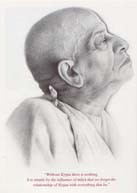
SRILA PRABHUPADA'S QUOTE OF THE DAY
My Guru Maharaja, my spiritual master, used to say that you
have to select a spiritual master not by seeing but by your ear, but by
hearing. And you don't select a spiritual master who has got a very good
hair or beard or some very beautiful feature, "Oh, he is a very good, nice
looking." No. You must hear. Tad viddhi pranipatena. Sruti. The whole process
is sruti. The Vedas are called sruti. The ear has to aural reception.
B.G. 4.24.34 Lecture, N.Y 1973
Sign-up to receive these quote HERE:
mailto:haribol@pacific.net.sg

Ignorance vs Transcendental Knowledge
http://guruvakya.com/guru-vakya/ignorance-vs-transcendental-knowledge
“Basically the problems that we are facing in the world today, when
we look in the newspapers, we can sum it all up into one common denominator
– IGNORANCE! The prejudice, misunderstanding, the lack of mercy, the lack
of responsibility to ecology, to the world, the lack of honesty amongst
leaders, lack of personal satisfaction, lack of love, are all due to Ignorance.
So what is the anecdote for ignorance? KNOWLEDGE! Knowledge is the actual
cure for ignorance. It’s like if you have darkness, what is the anecdote
for darkness? Light. So there is a Vedic saying which is very famous, Tamaso
Ma Jyotir Gamayah, “Come out of the darkness of ignorance by bathing in
the light of transcendental knowledge.”
Every human being has the responsibility of gathering transcendental
knowledge. It’s not something you can inject intravenously or something
someone else can do it for you.Transcendental knowledge is something, each
person has to consume and digest intellectually and mentally realize it.”
HH Jayapataka SwamiFrom the book: Taking Shelter of Krishna
Courtesy: Mathuradesh Publications

Bhaktivedanta Vedabase Network ...
http://vedabase.net/


The Scientific - Mathematical
Proof for God's existence:
http://geocities.com/sector114

http://robot-hosting.com/php/login_nicholas.html
user name = guest
password = guest
(Collection of philosophical and mathematical proofs
for existence of God can be found in this site.)

Scientifically Philosophical Books for the layman
 ...
... ...
...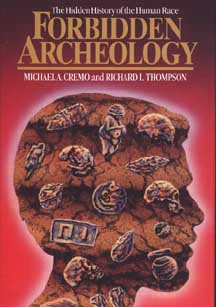 ...
...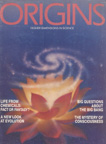
Click on any of these books to read more about them and where to get
a copy
or contact your local temple for purchases
sample of Life
comes from Life HERE.pdf

Lotus Imprints - Preserving Prabhupada's Legacy - The
Publishing House of Hari Sauri dasa
http://www.lotusimprints.com/

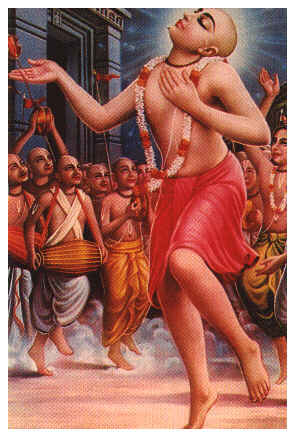
The following attached file includes Scriptural Evidences
Describing the Glories
of the Appearance of the Moonlike Lord Sri Chaitanya
Mahaprabhu - The Golden Avatara
Caitanya-candra_v2.pdf
Sri Gauranga Stavamala - A collection of nectarean prayers
to Lord Sri Chaitanya Mahaprabhu
Sri Gauranga Stavamrta.pdf

Vaisnava-ninda
Criticizing a Vaisnava
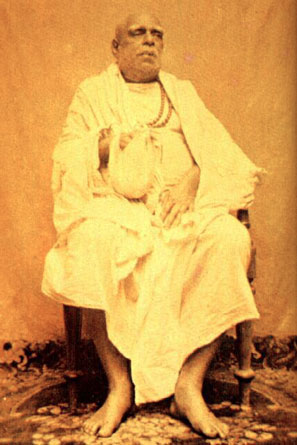
By Srila Bhaktivinoda Thakura
The Result of Blaspheming a Vaisnava
Among all the different types of offences a jiva (living
being) can possibly commit, no offence is more severe than blaspheming
a Vaisnava. It is therefore essential to contemplate the meaning of vaisnava-ninda
according to the scriptures. It is written in the Skanda Purana:
nindam kurvanti ye mudha
vaisnavanam mahatmanam
patanti pitrbhih sardham
maha-raurava-samjnite
hanti nindati vai dvesti
vaisnavan nabhinandati
krudhyate yati no harsam
darsane patanani sat
That foolish person who criticizes an exalted Vaisnava
falls down to the hell known as Maharaurava, along with his forefathers.
Whoever (1) kills a Vaisnava, (2) blasphemes him, (3) feels malice toward
him, (4) does not properly greet him upon seeing him, (5) becomes angry
with him or (6) does not feel joy upon seeing him, certainly becomes degraded
as a result of these six types of misconduct.
It is written in Srimad-Bhagavatam (10.74.40):
nindam bhagavatah srnvams
tat-parasya janasya va
tato napaiti yah so ’pi
yaty adhah sukrtac cyutah
A person who does not promptly leave that place where
blasphemy of Bhagavan or His dedicated devotee, the Vaisnava, is perpetrated,
becomes bereft of all his previously accumulated spiritual merit (sukrti)
and meets with degradation.
Different Categories of Jivas and Appropriate Conduct
with Each
Having thus been forewarned about vaisnava-ninda, it is
absolutely imperative to first ascertain what specifically designates one
a Vaisnava, and then determine which acts result in vaisnava-aparadha (offences
to Vaisnavas). All jivas fit into one of four categories: (1) ordinary
jivas; (2) religious jivas; (3) brahmanas and those jivas who resemble
Vaisnavas (vaisnavapraya jivas); and (4) vaisnava-jivas.
With the wisdom that Sri Krsna resides in the heart of
all jivas, one should honour every living being. A deeper respect should
naturally be shown to the religious jiva, and, beyond this, it is imperative
to feel even deeper honour for the brahmana-jiva and the vaisnava-praya
jiva. But above all, it is enjoined that one must worship and serve the
lotus feet of a vaisnava-jiva.
If one fails to offer respect to the common jiva, special
respect to the religious jiva, and befitting honour to the brahmana and
vaisnava-praya jivas, then one incurs sin (papa). However, to disrespect
or dishonour a vaisnava-jiva is actually an aparadha (an offence against
divinity). There is no form of sin that cannot be destroyed by performing
ordinary penances,but an aparadha committed against a Vaisnava is not easily
eradicated. Sins affect the gross and subtle material bodies, whereas an
aparadha specifically affects the jiva’s quest to establish himself in
his constitutional position as a pure spirit soul, causing him to fall
from his path. Therefore, those who wish to perform loving worship of the
Supreme Lord (bhagavad-bhajana) must diligently protect themselves from
committing aparadha.
Three Types of Vaisnavas According to Srimad-Bhagavatam:
Kanistha, Madhyama and Uttama
In Srimad-Bhagavatam, three specific categories of Vaisnavas
are described in the following three verses:
The neophyte, or kanistha, Vaisnava –
arcayam eva haraye
pujam yah sraddhayehate
na tad-bhaktesu canyesu
sa bhaktah prakrtah smrtah
Srimad-Bhagavatam (11.2.47)
He who engages in worshipping the deity as Bhagavan Sri
Hari, with ordinary faith received through some lineage of worldly teachers,
but who does not engage in worshipping Sri Hari’s devotees, is a kanistha
Vaisnava, or neophyte Vaisnava. In other words, he is just beginning to
enter into understanding the science of bhakti.
The specific difference between worldly, traditional faith
and faith based on the revealed scriptures (sastriya-sraddha) is that the
former arises from mere conventional, worldly education, whereas in the
latter, namely sastriya-sraddha, faith in the Vaisnavas arises from deep
conviction in the words of the scriptures and is based on the evidence
presented therein. It is only with the advent of sastriya-sraddha that
the jiva becomes a madhyama Vaisnava, or intermediate Vaisnava.
Until sastriya-sraddha has arisen, the obligation of a
sadhaka (a devotee in the stage of practice) to perform karma does not
wane. In this regard, Sriman Mahaprabhu has said:
suddha-vaisnava nahe, kintu vaisnavera praya
Such persons are not pure Vaisnavas, but they resemble
Vaisnavas.
Solely by genuine association with true Vaisnavas, the
kanistha Vaisnava, who is a vaisnava-praya jiva, can become a suddha Vaisnava
(pure Vaisnava).
The intermediate, or madhyama, Vaisnava –
isvare tad-adhinesu
balisesu dvisatsu ca
prema-maitri-krpopeksa
yah karoti sa madhyamah
Srimad-Bhagavatam (11.2.46)
He who offers his love to the Supreme Lord, Sri Bhagavan;
remains a sincere friend to all Vaisnavas; shows mercy to the innocent*;
and, through the most appropriate use of indifference, tolerance or even
complete avoidance, neglects those who are envious of Bhagavan and the
Vaisnavas, is a madhyama Vaisnava.
_______________
* This refers to the vaisnava-praya jivas, or those living
entities who resemble Vaisnavas but are not yet conversant with the science
of bhakti.
In this way, the madhyama Vaisnava even shows fitting
mercy to the envious, seeing them as ignorant. Only the madhyama Vaisnava
is actually qualified to serve the Vaisnavas.
Since the kanistha Vaisnavas do not engage in such service,
they cannot be called Vaisnavas; rather, they are known as vaisnava-praya
(those who resemble Vaisnavas).
The topmost, or uttama, Vaisnava –
sarva-bhutesu yah pasyed
bhagavad-bhavam atmanah
bhutani bhagavaty atmanyesa
bhagavatottamah
Srimad-Bhagavatam (11.2.45)
He who experiences the revelation of his own cherished
form of Bhagavan in the hearts of all jivas, including his own; who experiences
that all jivas, their very existence resting in Bhagavan, are fully surrendered
to that same Supreme Absolute Reality; and who perceives everyone in the
whole world as a Vaisnava, is known as an uttama Vaisnava (topmost Vaisnava).
Such a Vaisnava does not see the difference between a Vaisnava and a non-Vaisnava.
Three Classifications of Vaisnavas
According to the Teachings of Sriman Mahaprabhu:
Vaisnava, Vaisnava-tara and Vaisnava-tama
The only conclusion to be drawn then is that when those
who were in the kanistha stage attain faith in the scriptures (sastriya-sraddha)
and hence become eligible to serve the Vaisnavas, they are thereafter described
simply as vaisnava (having vaisnava qualities) until the time when they
attain the other qualities characteristic of a madhyama Vaisnava. Correspondingly,
madhyama Vaisnavas are described as vaisnava-tara (having vaisnava qualities
to a profound degree) while uttama Vaisnavas alone, the topmost Vaisnavas,
are described as vaisnava-tama (having vaisnava qualities to the superlative
degree).
_______________
* The word vaisnava is here being used as an adjective,
as in “having vaisnava qualities”, and the affixes tara and tama modify
that adjective to the intensified and superlative degrees respectively.
It is necessary to deliberate upon the way in which Sriman
Mahaprabhu introduces us to these three types of Vaisnavas:
One who is vaisnava –
“ataeva yanra mukhe eka krsna-nama
sei ta’ vaisnava, kariha tanhara sammana”
Sri Caitanya-caritamrta, Madhya-lila (15.111)
One who chants the name of Krsna* even once is vaisnava
(possessed of vaisnava qualities). Therefore, you should show all respect
to him.
_______________
* In this article the term krsna-nama, or “the holy name
of Krsna”, refers to suddha-nama – as distinct from nama-aparadha (offensive
chanting of the holy name) and nama-abhasa (a semblance of chanting the
holy name). Suddha-nama is directly Krsna Himself in the absolutely pure,
transcendental form of His holy name.
One who is vaisnava-tara –
‘krsna’-nama nirantara yanhara vadane
sei se vaisnavatara, bhaja tanhara carane
Sri Caitanya-caritamrta, Madhya-lila (16.72)
One who incessantly chants Krsna’s name is vaisnava-tara
(possessed of vaisnava qualities to a profound degree) and one should render
service to his lotus feet.
One who is vaisnava-tama –
yanhara darsane mukhe aise krsna-nama
tanhare janiha tumi ‘vaisnava-pradhana’
krama kari’ kahe prabhu ‘vaisnava’-laksana-
‘vaisnava’, ‘vaisnavatara’, ara ‘vaisnavatama’
Sri Caitanya-caritamrta, Madhya-lila (16.74–75)
One who inspires others to chant krsna-nama merely by
being visible to them is vaisnava-tama (possessed of vaisnava qualities
to the superlative degree) and is the topmost Vaisnava.
Sri Caitanya Mahaprabhu thus explained the different grades
of Vaisnavas in sequence – those who are vaisnava, those who are vaisnava-tara
and those who are vaisnava-tama – in accordance with the symptoms
they each exhibit.
According to these teachings of Sriman Mahaprabhu, one
who merely utters krsna-nama is eligible to be described as a Vaisnava.
Among the kanistha bhaktas, those who are described as vaisnavapraya (resembling
Vaisnavas), or else vaisnava-abhasa (the semblance of a Vaisnava) only
chant namabhasa (a semblance of the holy name). They do not chant suddhanama
(the absolutely pure holy name). However, those who are, in fact, able
to chant suddha-nama, even once, have vaisnava qualities and are suddha
Vaisnavas; those who incessantly chant suddha-nama are vaisnava-tara (possessed
of Vaisnava qualities to a profound degree); and those who cause others
to chant krsna-nama merely by being visible to them, are vaisnava-tama
(possessed of Vaisnava qualities to the superlative degree).
One who chants suddha-krsna-nama
even once is indeed a Vaisnava
& Diksa (initiation) is unnecessary in terms of
the existential reality (tattva) of sri näma
At this point, one more thing needs to be considered.
Becoming a suddha Vaisnava does not depend on the process of taking diksa
(ceremonial initiation). Diksa is the process whereby a person receives
a mantra for the worship of Sri Hari’s deity form, and thus comes at least
to the stage of vaisnava-praya.
In terms of the existential reality of the holy name (nama-tattva),
such diksa is unnecessary. As Sriman Mahaprabhu has said:
prabhu kahe,“yanra mukhe suni eka-bara
krsna-nama, sei pujya,srestha sabakara”
Sri Caitanya Mahaprabhu answered, “He from whose mouth
krsna-nama is heard even once is worshipful and is the best among human
beings.”
eka krsna-name kare sarva-papa ksaya
nava-vidha bhakti purna nama haite haya
Even uttering Krsna’s name a single time destroys all
of one’s sins. The nine-fold process of devotional service (navadha-bhakti)
attains completeness only through nama.
diksa-purascarya-vidhi apeksa na kare
jihva-sparse a-candala sabare uddhare
One is not required to undergo the process of receiving
diksa or any preparatory regulative rites in order to chant krsna-nama.
Simply by coming in contact with the tongue, krsna-nama delivers everyone,
including even the most degraded class of men.
anusanga-phale kare samsarera ksaya
citta akarsiya karaya krsne premodaya
Sri Caitanya-caritamrta, Madhya-lila (15.106–109)
As a secondary result of chanting krsna-nama, one’s material
entanglement is terminated. The primary result is that the mind and heart
of the chanter become uncontrollably drawn to Krsna and finally krsna-prema
awakens in his heart.
ataeva yanra mukhe eka krsna-nama
sei ta’ vaisnava, kariha tanhara sammana
Sri Caitanya-caritamrta, Madhya-lila (15.111)
One who even chants Krsna’s name a single time is described
as a Vaisnava; therefore you should show him utmost respect.
The Difference Between Sri Nama and Namabhasa
& Those who Chant Namabhasa are not Vaisnavas
The difference between nama and namabhasa is not the topic
of our present deliberation. This shall be discussed specifically at another
time. Herein, this much can be said: when krsna-nama is chanted with sastriya-sraddha
(faith in scripture), that is, with unalloyed surrender, then it is nama.
When nama is chanted with desires unrelated to making Krsna happy (anyabhilasita),
or when it is eclipsed by jnana (dry, impersonal knowledge), karma (reward
seeking action), vairagya (renunciation born of aversion) and so forth,
it is namabhasa.
Although the chanting of namabhasa can award any result,
even up to emancipation from the material energy (mukti), the Vaisnava
only chants suddha-nama and is never inclined to chant any form of namabhasa.
When nama is chanted by one who has knowledge of His actual
svarupa, who understands that nama and nami (the name and the named) are
non-different, and who has realized that nama only makes His appearance
upon the pure transcendental senses of the jiva, only then is it nama.
When that nama appears on someone’s tongue, even once,
he becomes a Vaisnava. By the time nama appears, all of one’s fructified
(prarabdha) and unfructified (aprarabdha) sins are destroyed. And along
with the awakening of such nama comes love of Godhead.
The Vaisnava who chants suddha-nama
is endowed with all good qualities,
is free of sins and has no interest
in pious or impious activities
A Vaisnava is naturally endowed with all good characteristics
and is devoid of all vice. It is stated in Sri Caitanyacaritamrta:
sarva maha-guna-gana vaisnava-sarire
krsna-bhakte krsnera guna sakali sancare
Sri Caitanya-caritamrta, Madhya-lila (22.75)
All exalted virtues reside in the body of a Vaisnava.
All the transcendental qualities of Krsna are transmitted to His bhakta.
vidhi-dharma chadi’ bhaje krsnera carana
nisiddha papacare tara kabhu nahe mana
Sri Caitanya-caritamrta, Madhya-lila (22.142)
A Vaisnava exclusively worships Sri Krsna’s lotus feet,
so even though he casts aside the regulative principles and conduct prescribed
for the discharge of varnasrama-dharma (righteous societal duty), his mind
is never tainted by the inclination to engage in prohibited, sinful activities.
ajnane va haya yadi ‘papa’ upasthita
krsna tanre suddha kare, na karaya prayascitta
Sri Caitanya-caritamrta, Madhya-lila (22.143)
If, however, a Vaisnava somehow unknowingly becomes implicated
in sinful activity, Krsna does not make him undergo the ordained method
of atonement, but personally purifies him instead.
jnana-vairagyadibhaktira kabhu nahe ‘anga’
ahimsa-yama-niyamadi bule krsna-bhakta-sanga
Sri Caitanya-caritamrta, Madhya-lila (22.145)
Never mistake the cultivation of knowledge and renunciation
as limbs of bhakti in their own right, for all good qualities such as gentleness,
control over the mind and senses, and appropriate renunciation automatically
accompany the krsna-bhaktas.
asat-sanga-tyaga,ei vaisnava-acara
‘stri-sangi’eka asadhu, ‘krsnabhakta’ ara
Sri Caitanya-caritamrta, Madhya-lila (22.87)
To discard the company of those who diminish one’s resolve
in krsna-bhakti (asat-sanga) is truly the natural conduct of a Vaisnava.
And the most detrimental association of all is those who enjoy the company
of women and the non-devotees.
The day krsna-nama appears on someone’s tongue, even a
single time, he will lose all taste for sinful activities. What to speak
of taste for sinful activities, he will even lose interest in pious activities.
All three classifications of Vaisnavas – namely those
who are vaisnava, those who are vaisnava-tara and those who are vaisnava-tama
– are devoid of any form of material contamination, flawless and without
sin. If it is observed, however, that a person is actually inclined toward
sinful activities, then he is not to be counted among the Vaisnavas. Even
the kanisthavaisnavas* have no inclination for pious or impious activities.
_______________
* Also known as vaisnava-praya
Wicked people see faults in a Vaisnava in three ways
Pure Vaisnavas have no faults and are therefore above
criticism. But those who do criticize them just blame them and vilify them
wrongly. Such wicked persons hatefully criticize the Vaisnavas in the following
three ways:
(1) They criticize all the faults that existed in
a person before suddha-bhakti manifested in him. In actual fact, as soon
as bhakti appears in one’s heart, all of one’s faults begin to quickly
disappear.
(2) During the period of time in which any untoward
propensities are being destroyed within the Vaisnava’s heart, wicked people
take the opportunity to criticize him for any faults that may still remain
in him.
(3) Although an exalted Vaisnava is never inclined
toward faulty behaviour, sometimes, due to divine providence, some unwarranted
conduct may be observed in him. Though such faulty behaviour can never
remain a permanent habit in the Vaisnava, wicked people still criticize
him for it.
In this way, these heartless people lead themselves to
their own doom by committing the wicked deed of blaspheming a Vaisnava.
Therefore, in the book Namatattva-ratnamala, it is said:
prag bhakterudyaddosah ksayavasista eva ca
daivotpannasca bhaktanam naivalocyah kadacana
saduddesyamrte yastu mrsapavadameva ca
dosanalocayatyeva sa sadhu-nindakohadhamah
One should never reflect upon the faults of a bhakta –
namely, those that were present in him before bhakti awakened in him, those
that temporarily remain during the time when his heart is purified through
his practice of bhakti, and those that may appear in him accidentally due
to providence. One who reflects upon any of these faults, not with a good-hearted
purpose but rather with slanderous intent, is a blasphemer of saints and
is extremely degraded.
Criticism of a Vaisnava’s previous faults is abominable
O readers, any faults that were present in a Vaisnava
before the onset of bhakti should never be reflected upon, unless there
is some good-hearted purpose in doing so. A Vaisnava should not be criticized
for the insignificant remnants of his previous faults. This is why Sri
Krsna has said in Srimad Bhagavad-gita (9.30–31):
api cet suduracaro
bhajate mam ananya-bhak
sadhur eva sa mantavyah
samyag vyavasito hi sah
ksipram bhavati dharmatma
sasvac-chantim nigacchati
kaunteya pratijanihi
na me bhaktah pranasyati
Even a man of abominable character who engages in loving
service performed with one-pointed dedication (ananya-bhajana) to Me is
still to be considered a saint due to being rightly situated in bhakti.
He quickly becomes virtuous and attains eternal peace. O Kaunteya, declare
it boldly that My bhakta never perishes.
It is offensive to criticize a Vaisnava for his waning
faults
or for any fault that appears by providence
By the influence of bhakti all the extremely abominable
kinds of behaviour that may have existed in one’s heart before the awakening
of bhakti and have gradually become one’s acquired nature (nisarga) diminish
day by day and are finally destroyed within a very short time. Therefore,
criticizing a Vaisnava without a virtuous motive, because of the presence
of such waning faults, results in vaisnava-aparadha. Even if one observes
some accidental fault in a Vaisnava that occurs due to divine providence,
one should still not criticize him. In this context, Sage Karabhajana has
said:
sva-pada-mulam bhajatah priyasya
tyaktany abhavasya harih paresah
vikarma yac cotpatitam kathancid
dhunoti sarvam hrdi sannivistah
Srimad-Bhagavatam (11.5.42)
That person who engages in exclusive bhajana of the lotus
feet of Sri Bhagavan, having left all else, is most dear to Him. Even if
the tendency to engage in some sinful, forbidden act somehow appears in
his heart, Paramesvara Sri Hari, who resides directly within his heart,
not only destroys those tendencies but also removes any reaction that would
have come as a result of having committed some sin.
The underlying principle is that wrongly blaming and criticizing
a Vaisnava for any of the faults just mentioned, which fit into three categories,
leads to nama-aparadha, offences against the holy name. If one commits
nama aparadha, a sphurti (divine revelation) of nama will never take place,
and without such sphurtis it is not possible to become a Vaisnava.
The faults of others can be deliberated upon if one has
a virtuous motive
At this point, an opposing argument may arise: would it
be appropriate to deliberate on a fault found in a Vaisnava that is not
counted among the three types of faults just mentioned? The answer is that
no fault other than these three types can exist in a Vaisnava. If someone
has faults that do not fit into one of these three types, then, according
to the revealed scriptures, they cannot be called Vaisnavas.
We should consider that, without the right motive, it
is inappropriate to reflect, even impartially, upon the faults of any living
being, what to speak of Vaisnavas. To blaspheme Vaisnavas is an offence,
but even blaspheming other jivas is a sin. Vaisnavas have no interest in
performing such a sinful act.
However, provided one has the right motive, the scriptures
have not condemned a careful critique of someone’s faults.
Proper motive is of three types:
desiring the welfare of the person criticized,
desiring the welfare of the world
and desiring one’s own welfare
There are three types of proper motive:
(1) If the intention in analyzing someone’s sins
is to ensure that he attains his ultimate welfare, then such reflection
is auspicious.
(2) If the motive behind reflecting on someone’s
sins is to benefit the whole world, then this is to be counted as an auspicious
act.
(3) If such reflection is undertaken for one’s own
spiritual welfare, then it too, is auspicious. There is no fault in such
reflection.
When one reflects upon the historical accounts of personalities
like Valmiki or Jagai and Madhai in light of one or more of these three
virtuous motives, then such reflection is never the cause of incurring
sin. When a disciple humbly asks his spiritual master to instruct him on
how to identify a Vaisnava, the spiritual master, desiring the welfare
of his disciple and of the whole world, explains that those who exhibit
unholy behaviour are non-Vaisnavas. He thus points out how to identify
true Vaisnavas through antithesis.
With the motive of encouraging one to accept the shelter
of the lotus feet of a true Vaisnava by abandoning false, so-called preachers
of religion, one neither risks committing blasphemy of saints (sadhu-ninda)
nor vaisnava-aparadha (offence to Vaisnavas). In such cases, even criticism
directed at a specific person is free from fault. These are all examples
of criticizing with the proper motive.
To Abandon Bad Association and to Accept Association of
Devotees
O readers, you must all contemplate this profound subject
with the utmost care. As an irrevocably established principle, you must
offer all respect to true Vaisnavas and invariably abandon the association
of non-devotees. If one criticizes the true Vaisnavas, the existential
reality of the holy name will not manifest in one’s heart. Thus the instruction
has been given in Srimad-Bhagavatam (11.26.27):
tato duhsangam utsrjya satsu sajjeta buddhiman
santa evasya chindanti mano-vyasangam uktibhih
For all these reasons, intelligent people reject detrimental
association and associate instead with saintly persons. This is because
saintly personalities, with their powerful and virtuous instructions, cut
unholy, material attachments from the heart and thus dispel all the distress
they cause.
It is only possible for a madhyama-adhikari to serve saintly
persons
& unrighteous activity is Corrupting
You should not think that by serving a non-devotee, considering
him to be a saint, you will get the benefit serving a true saint. The reason
the madhyama Vaisnava, as mentioned before, is the only one who is able
to truly serve saints, is because the kanistha Vaisnava (neophyte) is not
yet inclined toward serving saints, while the uttama Vaisnava (topmost
Vaisnava) does not see the difference between a saintly man and an unsaintly
one.
O readers! You are madhyama Vaisnavas, and are therefore
duty-bound to search out and identify a saint and then befriend him. It
is also your duty to shower mercy upon those who are non-devotees, or in
some cases, neglect them. You will be at fault if you abandon your own
adhikara (rightful position).
The instruction of Srimad-Bhagavatam in regard to vice
and virtue is this:
sve sve’dhikare ya nistha
sa gunah parikirtitah
viparyayas tu dosah syad
ubhayor esa niscayah
Srimad-Bhagavatam (11.21.2)
Steadfastness in carrying out the duties of one’s own,
rightful position is declared to be a good quality, whereas deviation from
the duties of one’s position is considered a fault. In this way, the two
are clearly ascertained.
Even if you unintentionally fall into bad association,
you will become an offender to bhakti. As said in Srimad-Bhagavatam (3.23.55):
sango yah samsrter hetur
asatsu vihito’dhiya
sa eva sadhusu krto
nihsangatvaya kalpate
Even if someone falls into ungodly association due to
his ignorance, such association still leads to degradation. But in the
same way, even if someone finds himself in the association of saintly persons
accidentally, such saintly association very easily leads him away from
bad association and cuts his worldly attachment.
The uttama-bhaktas’ glory of seeing everyone as saints
is proclaimed in holy books such as Bhakta-mala and Prapannamrta. However,
such conduct should never be imitated by a madhyama Vaisnava. For a madhyama
Vaisnava, such behaviour would lead to the fault known as anadhikara-cesta
– not acting in accordance with one’s eligibility, or position – and he
would rapidly become degraded as a consequence.
May the suddha-bhaktas mercifully deem our discussion
of all these subjects to have been properly motivated.
Translated from Sri Gaudiya Patrika, Year 7, Issue 10
in Rays of The Harmonist, Kartika Issue, 2009.

Vaishnava Calendar
Courtesy of http://www.vedabase.com/
used
with permission









![]()
![]()
![]()
![]()
![]()
![]()

![]()
![]()
![]()
![]()

![]()
![]()
![]()
![]()


















